You went to your appliance store for a brand-new kitchen.
Most people end up unhappy with their decisions or the process of buying new appliances.
But not you.
I will break down the four biggest problems—and how you can solve—them before they escalate or even start.
Let's start with an unlikely place that might make you uneasy if you’ve already shopped.
Looking for answers about Appliances?
Short on time? Download our free Appliance Buying Guide.
How to Avoid Common Appliance Buying Mistakes: Top 5 Problems and Solutions
Problem Number One: Understanding How Salespeople Are Paid
Do You Know How Appliance Salespeople Are Paid?
The answer might shock you.
If you feel pushed into buying an unknown brand at your local store, you should be concerned.
In our industry, most brands "spiff" or incentivize salespeople directly. These incentives bypass the store owner, who probably doesn't care anyway because it saves them money.
However, these incentives are huge, especially for third-tier brands.
I have seen spiffs as high as $1,000 for an unknown pro range or expensive wall oven you shouldn't be buying.
The salesperson makes a good living by monetizing your trust.
Many of these brands have reliability issues and no service support. We don't allow spiffs because it prevents people from buying what they should.
We also service what we sell, so we only carry the most reliable brands.
Only nineteen brands are sold at Yale because we can only service nineteen faithfully.
One local competitor up the street has seventy-four brands. It's impossible to provide competent service to so many brands.
We logged over 37,000 service calls last year and over 100,000 in less than three years. Yet internet appliance companies will have way over 100. One has 150 brands, yet no service department.
Most of these brands will pay high commissions, so the salespeople will push them. They can't be sold any other way, certainly not on merits. But the after-service support will be lacking, to be polite.
We pay a commission, but only on the reliable brands sold. As a salesperson at Yale, you can't go off script and sell a brand that is not on the plan.
But you must be mindful, especially if you're buying expensive, odd brands for a lot of money. So just be careful. As always, I say to check reviews and ratings on store products, ask your neighbors, and be informed.
Don't go to a store and buy what they tell you unless you have the information you need to make that decision.
Next, let’s talk about a significant cost often deceptively advertised as free.
Problem Number Two: The Truth About Free Delivery
Is "Free Delivery" Actually Free?
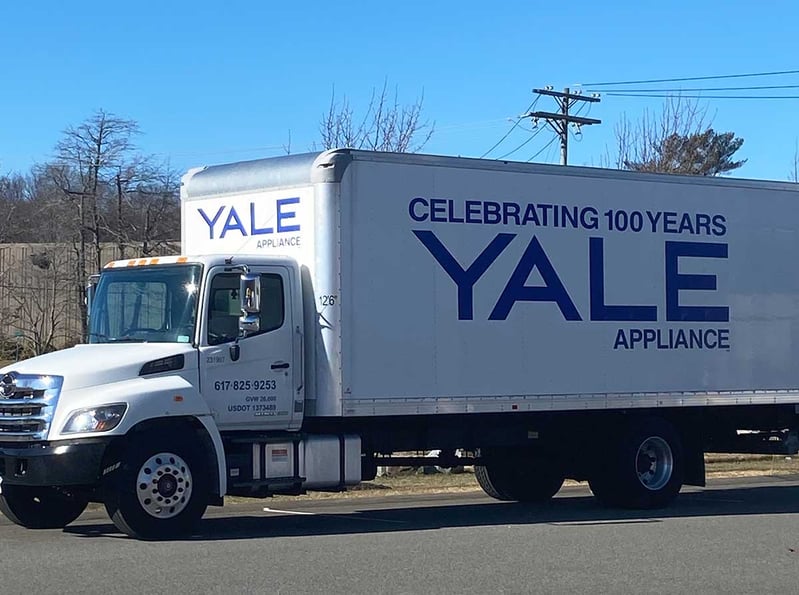
Ever buy an airline ticket online? You buy at the lowest price on Kayak, and then you have bag fees, seating assignment fees, and even the peanuts and water cost a few dollars now.
Welcome to the world of appliance delivery. Except airlines are better at executing the service. I know that’s saying a lot these days. Shockingly, airline travel is better than appliance delivery.
You must wait the whole day for an appliance delivery from many dealers, although some have invested in technology for just a two-hour wait.
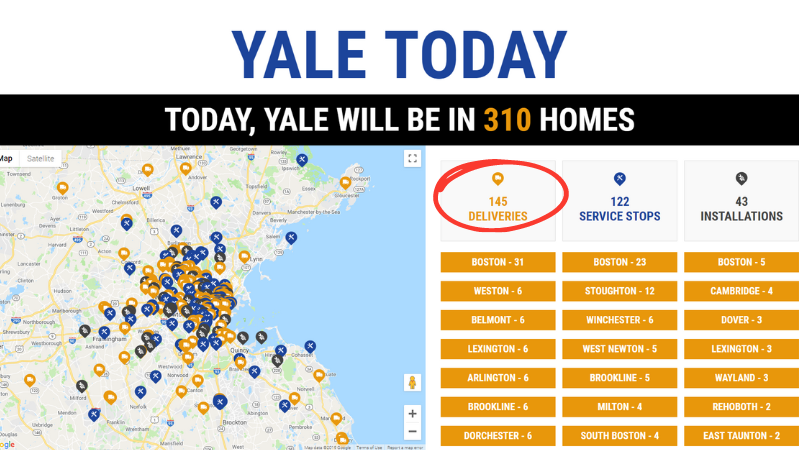
Then again, you know what's included in an airline ticket but probably not an appliance delivery.
Still, it's more than bringing a box to your home.
Here are some important questions to ask, especially since charges can be astronomical with internet-only appliance dealers:
- Do they bring the appliance into your house?
- What are the charges for stairs, connections, and cords?
- Do they connect new appliances?
- Do they remove the old appliance?
- Do they take away the trash?
- Are they insured? It seems like an intrusive question, but water leaks can cause extensive damage, especially if you live in a high-rise.
You should even ask the store if it runs CORI (Criminal Offender Record Information) checks on its drivers, installers, and service techs. CORI allows a company to check the criminal backgrounds of the people walking into your home.
Free Delivery
We stopped free delivery years ago because we needed professionals who would not scratch your floors, install, and remove your old appliance without complaint.
We also deliver 800-pound refrigerators and pro ranges and install dishwashers in many of the towers throughout Boston.
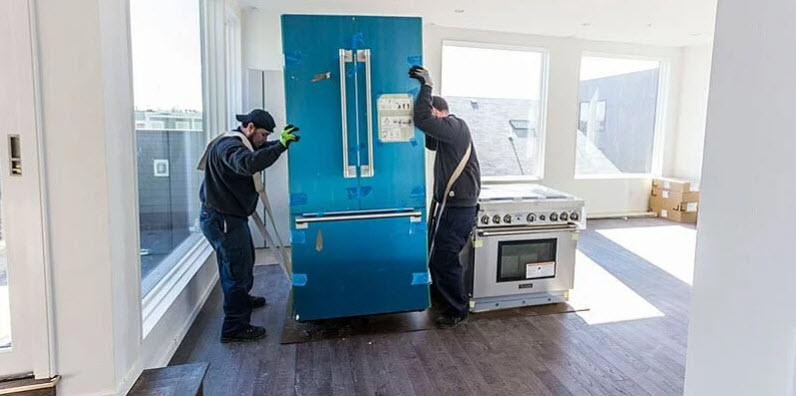
So we charge $129 for a complete delivery, normal installation, and removal.
However, free delivery is no longer free in any store unless the appliance is dropped on the curb.
At the box stores, removals cost $50 each, more for even normal installation, and fees for stairs.
So you want to compare the completed delivery of one store versus the completed delivery from another.
Download this delivery checklist to compare all the stores. Stores despise this checklist, which is the best reason to download it.
Read More: The Problem of Appliance Deliveries and Why You’ll End Up Paying More Than Expected
Problem Number Three: Avoiding Appliance Installation Mistakes
Appliance Installations Gone Wrong
I was reading a LinkedIn post. Our ex-service manager opened his own installation company. I saw on his LinkedIn profile that he installed one of the new 48-inch six-drawer refrigerators.
The installation was eight hours long.
As qualified installers and tradespeople are in short supply, many contractors are rethinking performing any type of installation. At the very least, they will have problems with newer, more labor-intensive installations.
Here's an interesting tidbit:
The hardest installation task isn't cutting granite or installing wall ovens—it's placing panels on refrigerators.
Because of the lack of skilled labor, we now have 18 installation teams just to handle our customers and contractors.
You must clarify who will install your appliances, whether the appliance store, contractor, cabinet shop, or other third party.
Installation Questions to Ask:
- How does it get coordinated if it's a third party?
- Does delivery come, and then you call the installer?
- Do they come at the same time? How does that work?
If the exact information is not clarified, the ball will be dropped, and your project will be delayed.
Delivery & Installation Liability
If there's damage in your home or the client's home, who is responsible if it's a third party?
You must document at the time of the incident and never sign the delivery document. It will release the agent and store from liability.
Then, you own that liability in your homeowner's insurance, which will invariably increase.
Must Do Tip:
This trick has saved us a few times per year. We have special paper placed under every dishwasher and washer.
.jpg?width=799&height=450&name=Leak-Protection-Pads-With-Yale-Appliance%20(1).jpg)
If a client sees water on that paper within 24 hours, we can return to rectify issues before any major water problems occur.
Grab any laminated paper and do the same. It could save you a ton of money and aggravation.
Read More: What You Should Expect From an Appliance Delivery
Problem Number Four: The Importance of After-Sales Service
How Important Is Service?
Well, that depends on the problem. A burner ignitor problem on a burner is not a cause for alarm because you have at least three more.
However, if you're in a family of five and the washer isn't working, that's fairly critical. If it's Thanksgiving and that oven doesn't work, that's a problem. So, put yourself in that situation.
Service is a huge problem that is not confined to just appliances.
You can't find a plumber or electrician these days.
The problem is a lack of focus on technical training, which leads to a shortage of skilled labor, such as appliance technicians.
In high school, I had an auto shop and technical training. Now, there is more focus on bachelor's degrees and less on vocational education.
We now have thirty-eight service techs and could use another twenty:
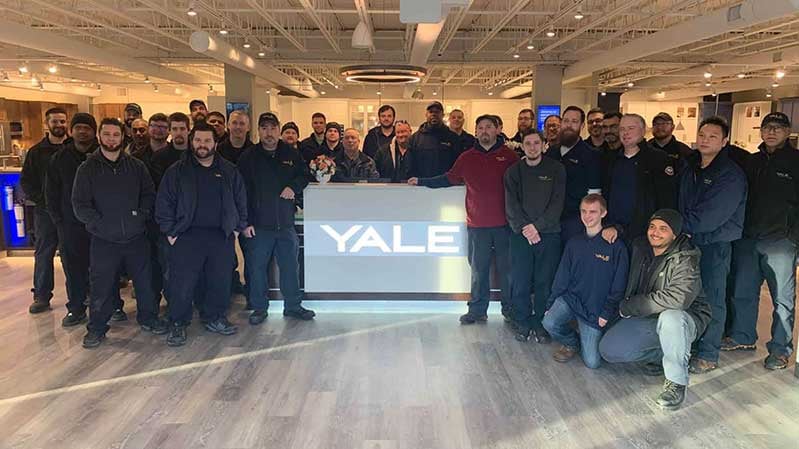
That's just for our clients because we only service what we sell. I'd love to service other customers, but cannot.
But you're probably on your own for service.
None of the major stores or even regional stores have service departments.
So my best advice to you is, once again, to look at reviews of every part of your experience.
If the sales associate says we use a reliable third party, call the number to determine how far our service is.
Many people always ask me on the blog and YouTube channel: Do I buy Thermador, Miele, Wolf, or Sub-Zero?
Finding out who has the best support in your area is the best place to start.
Read More: Why Doesn’t Every Appliance Brand and Store Offer Service?
Problem Number Five: Deciding on Extended Warranties
Do You Need An Extended Warranty?
I have been at Yale for almost 40 years. Sounds like a life sentence as I write it. For the first twenty years, we didn't sell extended warranties.
Why would I sell you a five-year warranty on that Maytag washer with an average life span of 20 years? Appliances have changed.
They are more energy efficient but require more service and maintenance. That French-door refrigerator with ice through the door will probably leak, and that high-output burner will probably have an issue within five years.
Appliances need repair 9.5% of the time in the first year. So a five-year warranty, in some cases, makes sense.
However, the extended warranty and scheduling service make no sense. Most of the time, they are just paper warranties with little or no service behind them.
Once again, most retailers do not have service, so they will send anyone willing to fix your appliance at the lowest possible fee. Self-servicing dealers are a good option. However, many still choose the third party rather than go through the self-insuring accounting process.
It will also be interesting to see State Farm and Allstate in the appliance warranty business.
Your best bet is to buy that warranty from a reputable service agent or not buy and take your chances.
Read More: Are Appliance Extended Warranties Worth the Cost?
How to Avoid Common Appliance Buying Mistakes: Key Takeaways
Your best bet for avoiding problems is preparation before you buy.
Spend more time investigating service, delivery, and installation than you would picking brands.
Always check reviews on Google, Yelp, and BBB (but their membership pays for some sins) for anyone related to your appliance purchase.
Don't fall for that expensive unknown brand unless the features merit the purchase.
Summary: Top Problems When Buying Appliances and How to Solve Them
Defective Appliances
- Problem: Sometimes, appliances can be defective right out of the box.
- Solution: Always check the warranty and return policies before purchase. Test the appliance immediately and report any issues immediately to take advantage of return or exchange options.
Hidden Costs
- Problem: Additional costs such as delivery, installation, and extended warranties can add up.
- Solution: Ask for a detailed breakdown of all costs before purchasing.
High Energy Consumption
- Problem: Some appliances consume more energy than expected, leading to higher utility bills.
- Solution: Look for appliances with the Energy Star label. These are certified to be energy efficient and can save money in the long run.
Finding the Right Size
- Problem: An appliance that is too large or too small for the intended space can be a significant issue.
- Solution: Measure the space where the appliance will go, or better yet, have the store do it, including doorways and pathways, to ensure it fits during delivery. Check the product dimensions carefully before purchasing.
Features
- Problem: Buying an appliance lacking important features or having too many can lead to dissatisfaction or regret.
- Solution: Before shopping, make a list of must-have features. Research models online and read customer reviews to find an appliance that meets your needs.
After-Sales Service
- Problem: Poor after-sales service can make dealing with issues frustrating.
- Solution: Choose brands and stores known for good customer service. Ask about the store's service policies and read reviews about its after-sales support.
Practical Tips:
- Negotiate: Don't hesitate to haggle for a better price or additional perks like free delivery.
- Consumer Rights: Be aware of your rights as a consumer, especially regarding returns, refunds, and warranties.
- Long-Term Costs: Consider long-term costs such as maintenance, energy consumption, and the upfront price.
Additional Resources
Download the Yale Appliance Buying Guide covering all topics of appliances. Over 1 million people have read a Yale Guide.
Related Articles:


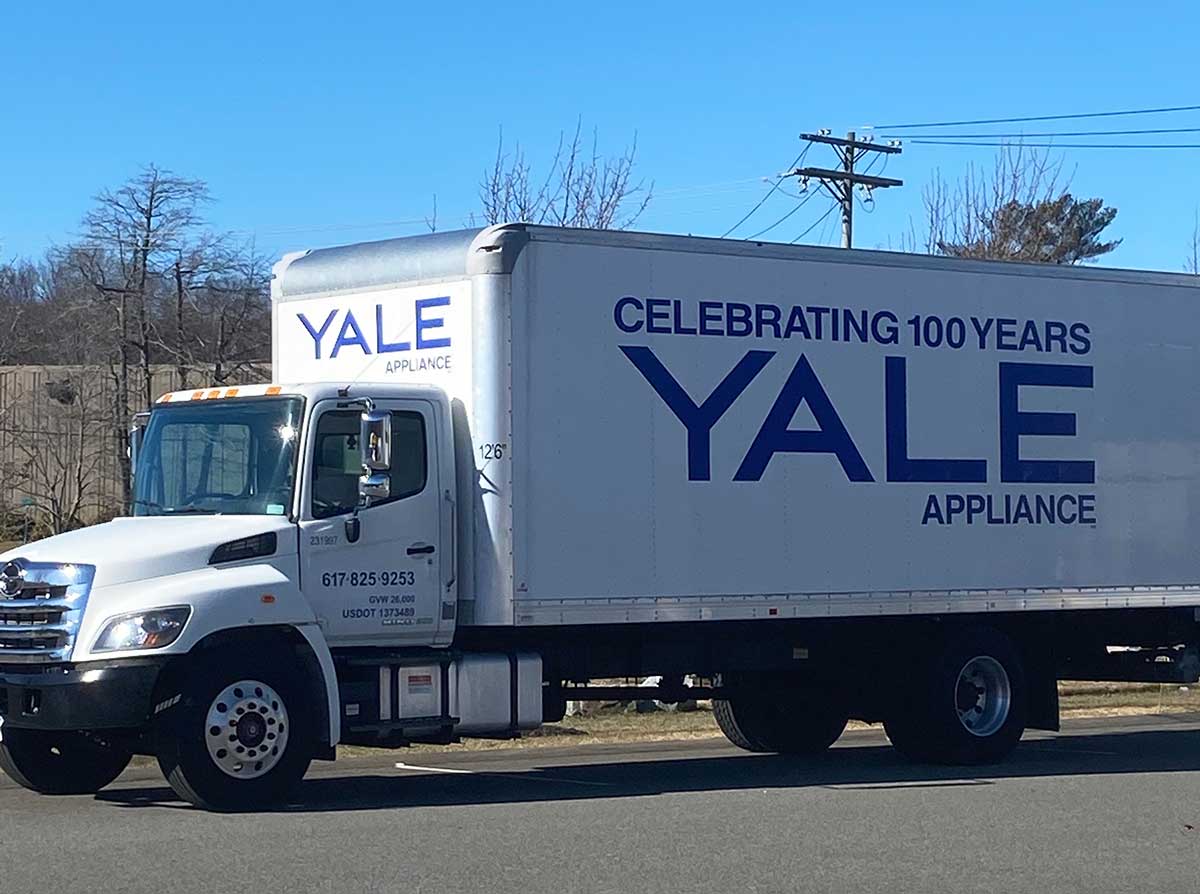



.jpg?width=799&height=450&name=Leak-Protection-Pads-With-Yale-Appliance%20(1).jpg)

